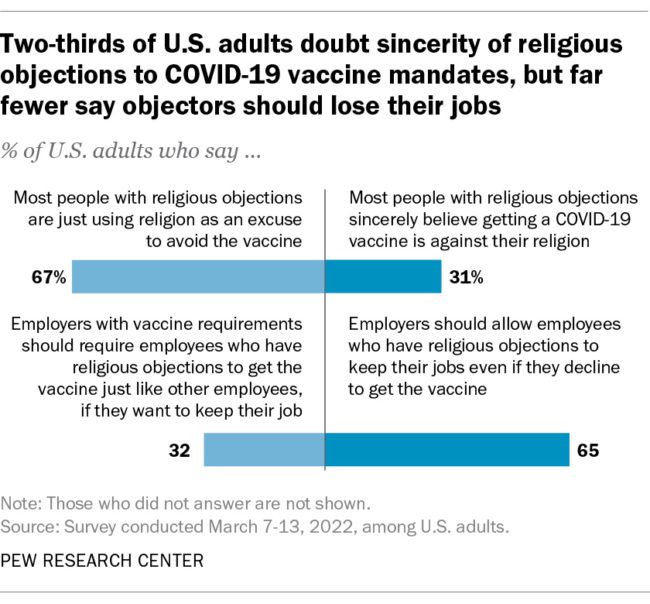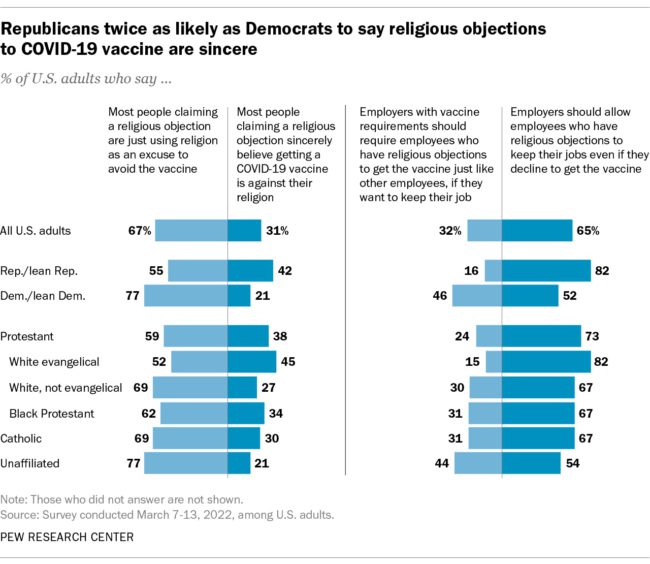
To answer the question in the title we can of course speculate, offer an opinion, or even try a straw poll or our own. None of that is necessary now because, on March 31, 2022, Pew published a poll that gives us a fascinating insight.
The title gives the game away, it is “Americans skeptical about religious objections to COVID-19 vaccines, but oppose employer mandates“
What are the numbers and what do they reveal?
Let’s take a look.
What do most think about those that have a religious objection?
Below are the statistics …

One fact, the obvious elephant in the room, is that the COVID vaccine has become a deeply politicized issue.
These are three foundational indisputable facts …
- COVID is real – yet there are some who deny it exists and claim, on the basis of no evidence at all, that it is a hoax.
- The deep impact of COVID is a statistical fact – beyond the number of deaths, close to 1 million in the US, more than half of those that get COVID still have lingering symptoms six months later.
- We have multiple vaccines that have been demonstrated to be effective
Knowing the above, you might think that common sense dictates that most people would consider it to be a rather good idea to get the vaccine and thus greatly reduce personal risk. You might also think that having vaccine requirements is a sensible idea, especially for those that come into contact with vulnerable people, such as within a healthcare context or those that care for high-risk people such as the elderly.
Apparently not.
Under normal circumstances, you would be right, most would indeed agree with you. Generally, the only exceptions would be those that embrace debunked mythology regarding COVID and/or vaccines.
Sadly, as you can see from the above, the statistics translate into rather large numbers of people who clearly reject what is obvious common sense.
Pew simply reports the numbers …
Two-thirds of U.S. adults say most people who claim religious objections to a COVID-19 vaccine “are just using religion as an excuse to avoid the vaccine,” while about a third (31%) say they think the objectors “sincerely believe getting a COVID-19 vaccine is against their religion.”
At the same time, most Americans do not think those with religious objections to the COVID-19 vaccine – regardless of the sincerity of their beliefs – should lose their jobs. A majority of adults (65%) say employers that require coronavirus vaccinations should “allow employees who have religious objections to keep their jobs even if they decline to get the vaccine.” Around a third (32%) disagree, saying the employers should “require employees who have religious objections to get the vaccine just like other employees, if they want to keep their job.”
What they don’t do is dig into why it is like this, but instead they just report what people are thinking.
Why is it like this?
This next bit is not a surprise, but for completeness, here it is.
Pew doesn’t just ask a question in isolation, they also gather other details. It is those other details that can reveal insights.
What Pew did was to break down the opinions expressed by politics and also religion. How is what we get …

As you can see, there is a spectrum of opinion here with White Evangelicals at one end, and the religiously unaffiliated at the other end. You can of course also see the political split there as well.
What is abundantly clear, no matter how you slice it is this …
- Most people can see thought the religious excemption charad and label it as an excuse.
In addition to that, there is this …
- Surprise-1: A majority of evangelicals are with you on that, even the white ones (52%, they agree that religious excemptions are just an excuse
- Supprise-2: The majority of Republicians are also with you on that (55%), they also agree that religious excemption are just an excuse
Even the most potentially contentious justification, the supposed creation of vaccines via cell lines that came via an aborted fetus, is revealed to be religious cosplay. The most vocal staunch anti-abortion religious group, Catholicism, the church with the longest and deepest anti-abortion history, takes the stance that Catholics have … “a prima facie duty to be vaccinated, not only for the sake of their own health but also out of solidarity with others, especially the most vulnerable“.
They don’t duck the issue, but instead tackle it head-on like this …
‘all clinically recommended vaccinations can be used with a clear conscience and that the use of such vaccines does not signify some sort of cooperation with voluntary abortion
OK, let’s move on to the other big-ticket item – vaccine mandates.
What about those that refuse a vaccine and then get fired for refusing it?
On the surface, this feels very odd.
Nobody, no single grouping, political or religious, has a majority that thinks you should be fired if you refuse a vaccine.
If you refuse the vaccine and then go to work in … let’s pick an example … a care home looking after the very elderly, and you then bring COVID in and it kills many, should there not be consequences for that?
Don’t those that run such a care home have a duty of care and so they should have vaccine mandates for staff?
OK, hold that thought and consider this. One of the key pillars of medical ethics is that a patient has the ultimate decision-making responsibility for their own treatment. If a patient refuses treatment, even if it is for bad reasons, then ethically they have that right.
That however need not be a reason for them to be fired.
There is a middle ground here. The option most commonly available is this …
- You either have the vaccine, or you agree to regular tests to verify that you can safely interact with those at risk.
The availability of that alternative is why most probably do not think that refusing a vaccine should get you fired.
What is clear is that political/religious tribalism is very much in play.
Normally most would get the vaccine without too much bother. Hint: Smallpox is gone.
However, if the tribe you are associated with has embraced anti-vaccine as part of that identity, then you will adopt the same stance. If asked why, you will most probably cite “reasons” without really giving them much thought.
We humans can be like this. Often we will make decisions for emotional reasons. Later we will justify it to ourselves by having official “reasons”. If you then proceed to demolish such “reasons”, you will be astonished to observe that the decision remains intact and immune to criticism of the claimed “reasons”.
This is because the cited reasons are really not the reason the decision was made, we simply tack those on later.
